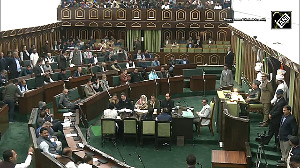Former Home Minister P Chidambaram had said the government of India would not file formal charges against Pakistani-American terrorist David Headley until Ajmal Kasab’s trial was over. Vicky Nanjappa reports
 A secret cable dated February 26, 2010, has revealed that the government of India was reluctant to use information on Pakistani-American terrorist David Coleman Headley.
A secret cable dated February 26, 2010, has revealed that the government of India was reluctant to use information on Pakistani-American terrorist David Coleman Headley.
Former US Ambassador Timothy Roemer had informed his home government in a cable that then Home minister P Chidambaram had said that India may not be using impeccable evidences against the perpetrators of the 2008 Mumbai attacks because of the suffocating legal intricacies and opaqueness in the case.
While the Mumbai Crime Branch was struggling to investigate the case, the Maharashtra government made its job tougher by bifurcating Headley’s case from the main 26/11 case.
Prosecutor Ujwal Nikam who had taken up the 26/11 case, primarily against terrorist Ajmal Kasab, had sought details on David Headley the moment his name cropped up in investigations.
Nikam wanted to add the Headley angle to the case to try in the same court. However, Chidambaram refused to share any information on the ground that Nikam was not a government prosecutor. He said Nikam was a private lawyer hired by the Maharashtra government for the trial.
Chidambaram said that the government of India would not file formal charges against Headley until Kasab’s trial was over. He feared that Kasab would use the charges against Headley to delay the conclusion of his own trial.
The National Investigation Agency was given the responsibility of investigating the larger angle of 26/11 attacks and the involvement of Headley and Pakistani-Canadian Tahawwur Hussain Rana.
The NIA registered a case on November 11, 2009, against Headley and Rana in Delhi for allegedly plotting terror attacks in India. As fresh facts started emerging and the involvement of officers from the Pakistan army and Inter-Services Intelligence was known, it filed not less than four chargesheets in the same case.
On July 21, 2010, a Delhi court issued non-bailable warrants against 5 Pakistanis -- Karachi residents Sajid Mir and Major Hashim, Pakistan army officers Major Iqbal and Major Sameer Ali, and PoK resident Illyas Kashmiri -- charging them with facilitating terrorist attacks in India.
While India should have been pushing hard for more details from the US, they were slow in their approach and caught in a web of legalities. Tahawwur Hussain Rana was acquitted by a US court after it was found that he had no involvement in the conspiracy angle.
India continued to watch the developments in the US since 2009 with little protest from the Indian government. The Federal Bureau of Investigation filed a chargesheet on October 21, 2009, at the Chicago court. The 48-page chargesheet, did not mention Rana and Headley’s role in the 26/11 attack.
Ironically, this came to light only when Headley and Rana were acquitted by the US court in the 26/11 attack. The FBI agents knew that if they implicated Rana in the 26/11 conspiracy and if there was a judgment against Rana in a US court, it would be hard for them to deny his extradition to India. The only mention about India found in the chargesheet was when the agent wrote about a proposed attack plan of the Lashkar-e-Tayiba to carry out the 26/11 attack.
Meanwhile in India, the prosecution on February 25, 2009, filed a 11,280 page chargesheet that does not even mention the word ISI in it. It only devotes one paragraph to the Lashkar. The centre did not insist that the David Headley angle be included in the main chargesheet.
While Chidambaram had claimed that adding Headley to the main chargesheet would delay the trial against Kasab, another chance to include some details was not taken. When Kasab appealed before the high court against the death sentence, the government of India once again refused to produce material regarding Headley.
Image: Pakistani-American Let operative David Coleman Headley











 © 2025
© 2025